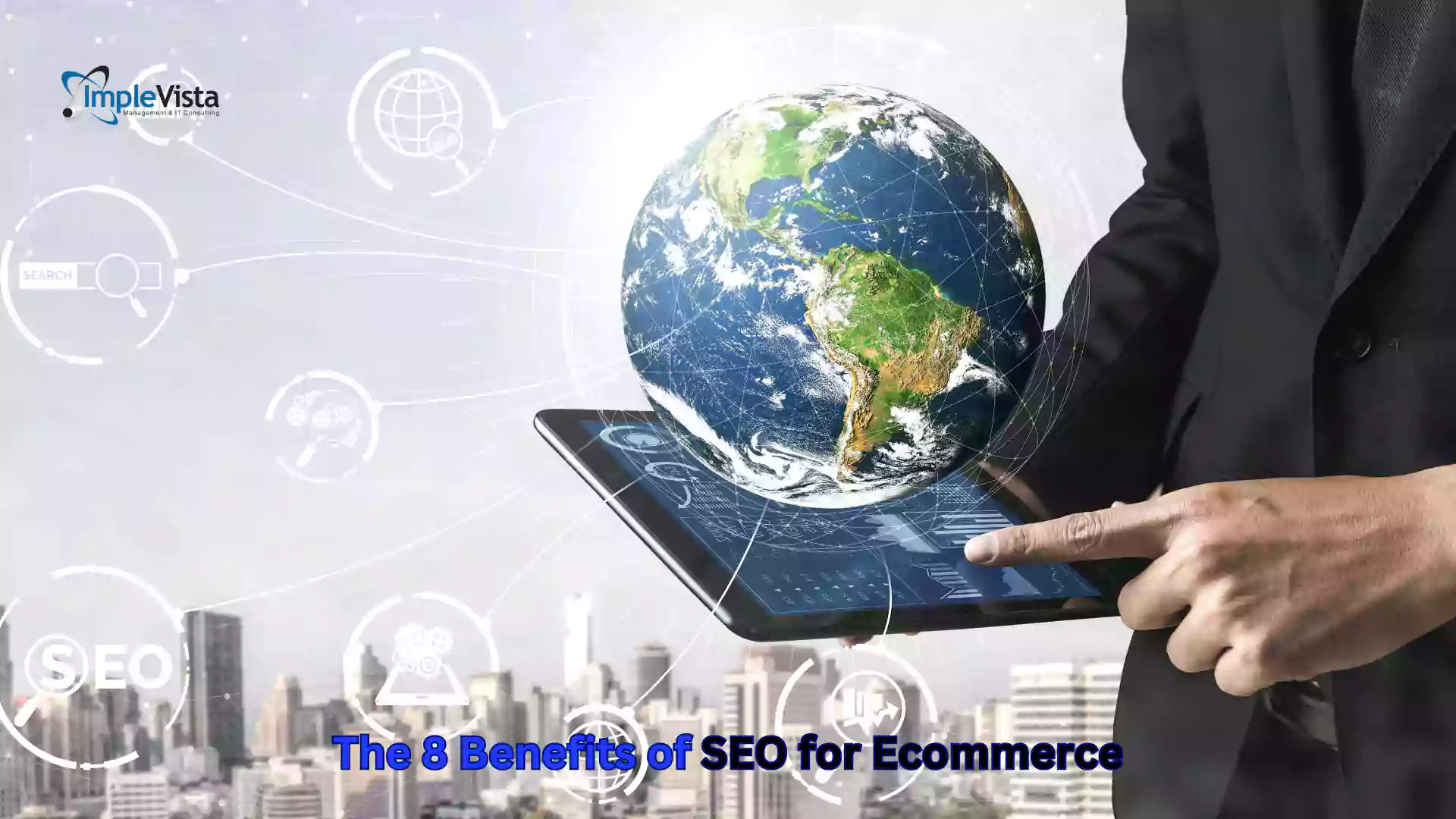E Commerce Business success depends on SEO. Optimizing your online store for SERPs increases organic traffic. Effective Search Engine Optimization methods are essential for keeping competitive in an industry where visibility can make or destroy a firm.
Importance of SEO for Online E commerce Business
Online shoppers utilize search engines to find and buy things. A poorly optimized ecommerce site risks being overlooked. Search engine optimization helps attract and keep consumers by making your shop visible. Not just any traffic, but sales-converting traffic.
Understanding SEO in Ecommerce
Search Engine Optimization optimizes a website for search engines like Google. It includes several methods to comply with search engine algorithms and boost a site’s keyword ranking.
How SEO Works for Ecommerce Websites
Search Engine Optimization for ecommerce optimizes product, category, and site structure pages. These include title tags, meta descriptions, picture alt texts, and URLs. We want search engines to crawl and index the site simply while offering a smooth user experience.
Essential SEO Elements for Ecommerce
Keywords: Ecommerce Search Engine Optimization starts with keyword research and integration.
Site Architecture: Well-organized sites improve navigation and help search engines grasp content hierarchy.
Mobile Optimization: Mobile ecommerce is rising; thus, your site must be mobile-friendly.
Page Speed: Quick-loading pages boost user experience and rankings.
Content: Quality, relevant content engages users and boosts Search Engine Optimization.
Types of SEO for Ecommerce
On-Page SEO: Website page optimization is called on-page SEO. Optimization comprises title tags, meta descriptions, header tags, and content. Ecommerce product descriptions and category pages are crucial.
Off-Page SEO: Off-page SEO works outside your website yet affects its ranking. Off-page SEO relies on high-quality backlinks from trusted sites. Social media engagement and influencer marketing boost off-page SEO.
Technical SEO: Technical SEO focuses on website performance and visibility from the backend. It includes optimizing site performance, mobile friendliness, crawl issues, and HTTPS security.
Local SEO: Local SEO is vital for ecommerce firms with physical presence or regional targets. Promote client feedback, manage Google My Business listings, and optimize your site for local search inquiries.
Importance of Search Engine Optimization in Ecommerce
Enhancing Visibility and Reach: Search Engine Optimization helps potential buyers find your ecommerce business in relevant search results. Visitors and purchases rise as your site ranks higher.
Building Brand Credibility and Trust: High SERPs indicate reliability and dependability. Your ecommerce site’s top search results boost its industry authority.
Driving Targeted Traffic: Search Engine Optimization involves attracting product-minded visitors, not simply traffic. By targeting keywords and improving content, you may attract a more relevant audience.
Increasing Conversion Rates: Search Engine Optimization brings consumers to your site and turns them into clients. With good Search Engine Optimization, visitors can locate what they need and buy more easily.
Long-Term Benefits of Search Engine Optimization: Search Engine Optimization gives long-term benefits, unlike paid advertising, which ceases producing traffic. If your ecommerce site performs well, it can draw organic visitors for months or years without expenditure.
SEO Strategies for Ecommerce
Keyword Research and Optimization: The foundation of Search Engine Optimization is keyword research. In ecommerce, this means finding out what keywords people use to find things. Your product pages, category descriptions, and blog posts should organically use these keywords.
On-Page SEO Best Practices: Product pages need relevant keywords, engaging descriptions, and clear calls to action for ecommerce SEO. Make sure photos are correctly categorized and pages load swiftly.
Technical SEO Implementation: Ecommerce sites’ complicated structures require technical SEO. We optimize the site’s performance, ensure search engine indexing, and eliminate crawl issues that prevent pages from being found.
Building High-Quality Backlinks: Search engines trust e-commerce stores with respectable backlinks. To get backlinks, network with influencers, bloggers, and industry magazines.
Content Marketing for Ecommerce: Ecommerce Search Engine Optimization requires content marketing. Create insightful blog entries, product manuals, and how-to articles to attract visitors and boost keyword rankings.
Common SEO Challenges in Ecommerce
Managing Duplicate Content: When product descriptions are identical, ecommerce sites typically have duplicate content difficulties. We can solve this by using canonical tags and producing product-specific information.
Handling Dynamic URLs: User-generated dynamic URLs might cause search engine indexing difficulties. Proper URL architecture and static URLs assist in indexing your websites.
Optimizing for Mobile Devices: Your ecommerce site must be mobile-friendly as more people purchase on mobile devices. Mobile optimization involves responsive design and fast load times.
Navigating Algorithm Changes: Search engine algorithms change. Keeping up with changes and adapting your Search Engine Optimization approach is crucial for ranking.
Balancing SEO and User Experience: Optimizing Search Engine Optimization and user experience are equally crucial. You should minimize keyword stuffing and make your site easy to browse and attractive.
Latest SEO Trends in Ecommerce
Voice Search Optimization: Voice search is growing, especially on mobile devices. Your ecommerce site should optimize for voice search utilizing long-tail keywords and natural language searches.
AI and Machine Learning in SEO: Machine learning and AI are increasing in Search Engine Optimization. AI tools like Google’s RankBrain help ecommerce sites comprehend customer intent, so they must provide relevant, high-quality content.
Mobile-First Indexing: Google now ranks and indexes sites based on their mobile versions. Optimizing your ecommerce site for mobile is crucial now.
Video SEO: Ecommerce marketing increasingly uses video. Search engine-optimized video content may boost site traffic and engagement.
Core Web Vitals: Google measures site user experience using Core Web Vitals. Page load time, interaction, and visual stability can boost SEO.
Measuring SEO Success in Ecommerce
Key Performance Indicators (KPIs) for SEO: Measure Search Engine Optimization effectiveness by tracking organic traffic, conversion rates, bounce rates, and average session time. These KPIs show the search engine performance of your e-commerce site.
Tools for Tracking SEO Performance
Several tools can help you monitor and measure the effectiveness of your Search Engine Optimization strategies:
Google Analytics: Analyzes user activity, traffic, and conversion rates.
Google Search Console: Displays indexing status and keyword performance for your site in Google search results.
SEMrush: A comprehensive tool for tracking keyword rankings, analyzing backlinks, and conducting competitive analysis.
Ahrefs: Known for its robust backlink analysis, Ahrefs also offers keyword tracking and site audit tools.
Moz: Offers tools for keyword research, site audits, and tracking keyword rankings.
Understanding SEO Analytics
SEO tool data interpretation is essential for decision-making. Watch long-term patterns, not short-term volatility. Target these areas:
Organic Traffic: An increase in organic traffic indicates that your SEO efforts are working.
Bounce Rate: High bounce rates suggest that people need help finding what they need on your site, which might harm relevancy or user experience.
Conversion Rate: Count visitors who become clients. Low conversion rates suggest user experience or search query relevance issues.
Keyword Rankings: Track search engine rankings for your keywords. You may alter your SEO approach with this.
Adjusting Strategies Based on Data: SEO requires regular data-driven strategy refinement. If specific keywords aren’t working correctly, consider improving your content or switching keywords. Continue covering a topic if it’s generating more visitors or conversions.
Future of SEO in Ecommerce
Evolving Search Engine Algorithms: Google constantly updates its algorithms to enhance search results. You need to be updated about these changes to maintain and improve your site’s rankings. More advanced algorithms prioritize user experience and content quality.
The Role of AI and Automation: Artificial intelligence and automation will increase SEO. AI tools can automate keyword research, content improvement, and user behavior analysis. Ecommerce SEO may depend on these technologies as they develop.
Emerging SEO Techniques: As technology changes, SEO tactics develop. This may involve sophisticated schema markup, voice search optimization, and tailored search. Staying ahead of these trends might help your online business.
The Importance of Adaptability in SEO: Search engine optimization is not automatic. Adapting to search engine algorithms, customer behavior, and technology is necessary. Flexibility and proactivity may keep your ecommerce business competitive over time.
Recap of Key Points: SEO is crucial to ecommerce. It boosts brand reputation, visibility, and targeted traffic. Understand on-page, off-page, technical, and local SEO to design a holistic approach that increases your online store’s performance. Staying competitive requires keeping up with voice search optimization and AI advances.
Final Thoughts on SEO for E-Commerce: E-commerce is competitive, so with SEO, your shop may be able to stand out. Search engine optimization attracts and retains clients. SEO takes work, but the long-term benefits—like increased organic traffic and brand reputation—are worth it.
Search Engine Optimization (SEO) is essential for eCommerce businesses for several reasons:
- Increased Visibility and Traffic
Search engines like Google rate websites higher using Search Engine Optimization. If your site ranks higher, potential buyers see it more. Higher exposure boosts organic traffic, which increases revenue.
- Builds Trust and Credibility
Many consumers trust websites on the first page of search results. Effective SEO may boost your eCommerce site’s trustworthiness, making users prefer your items over competitors.
- Cost-Effective Marketing
SEO has long-term benefits, unlike sponsored advertising. Money-effective marketing exists when your site ranks highly and you can manage it with minimal money.
- Improves User Experience
Optimizing site performance, mobile friendliness, and content quality improves user experience. A better user experience might result in higher conversion rates and recurring consumers.
- Competitive Advantage
In the competitive eCommerce space, Search Engine Optimization can give you an edge over competitors who need to invest in it. By ranking higher in search results, you can capture more market share and increase your customer base.
- Supports Local Searches
Local SEO increases visibility to local people searching for your products or services, which may boost foot traffic for eCommerce businesses with physical storefronts.
- Adapts to Consumer Behavior
Strong Search Engine Optimization helps your items stand out in search engines, where more shoppers investigate things before buying.
Traffic, trust, and revenue are all dependent on Search Engine Optimization for eCommerce businesses.
The 8 Benefits of SEO for Ecommerce
Recruiting new clients makes or breaks ecommerce enterprises. Search Engine Optimization traffic might be crucial to income growth. The reason.
SEO Benefits for Ecommerce
- Driving brand awareness. For cheap brand exposure, most ecommerce businesses need Search Engine Optimization. On the first page of search results or in Google’s Answer Box, a customer may discover your brand for the first time or recall visiting your site.
Ranking highly is also seen as an endorsement, which increases the probability of clicking on a top result.
- Filling the marketing funnel. New customers fuel the marketing funnel—awareness, interest, desire, and action. Search Engine Optimization helps generate low-cost awareness-stage top-of-funnel visitors.
However, Search Engine Optimization is involved at other levels, too. Shoppers’ keyword intent shifts from informative to transactional as they progress from awareness to interest (research) to action (buy). Targeting the right intent at the right time on your site moves shoppers to the next phase, improving conversions.
- Elevating content. It makes sense to promote transaction-intent keywords. Blogs, buyers’ guides, and how-tos have delayed value.
SEO helps with such stuff. Free content optimization can boost traffic significantly. It would help if you had keyword research, content optimization, a content management system, and time.
- Expanding remarketing audiences. Your paid search team can set retargeting cookies on organic search site visitors. Display adverts can be shown to shoppers when they leave your site. As more individuals visit your site, your remarketing audiences grow.
Visits to top-of-funnel content make Search Engine Optimization remarketing even more sensible. Online buyers are passively reminded that your brand offers value.
- Capturing the long tail. Fifteen percent of search queries are new to Google. Rare one-time words are part of the long tail, which includes inquiries that produce few searches yet account for approximately 40% of the total. Long-tail keywords convert better.
Since ecommerce sites are hierarchical, they may target long-tail queries. Clothing > Men’s Clothing > Accessories > Ties > Blue Ties > Blue Silk Ties is a famous fashion site click route. Further along the click route, those pages match long-tail keywords (“men’s blue silk ties”). However, they are too many to target. Scalable Search Engine Optimization must prevail.
- Improving the user experience. Excellent UX increases conversions. SEO optimizes site usability by understanding consumers. Rankings can improve.
Keyword data shows shoppers’ preferences. What they desire drives their quest, and sales are higher on sites that promptly satisfy that need. Data helps explain how buyers express their preferences. Their keywords on your site can boost it. Emphasizing low-cost alternatives may increase usability if most searches want “affordable blue silk ties.”
Users’ experiences are also crucial for Google’s ranking. Google thinks your site could be more relevant and attractive if many searchers click on it but then leave. That can damage rankings.
- Lowering paid search costs. If you cooperate on organic and sponsored search keywords, SEO-optimized content should boost Google Ads efforts. Cost per click is determined by Google’s Quality Score, which compares advertising to landing sites.
Landing page optimization improves Quality Scores, click costs, and organic search success.
- Creating lasting value. Search Engine Optimization is a long-term investment. Unlike advertising, its value continues beyond the campaign.
Search engine optimization is ongoing. Optimization efforts are always focused on your site’s content, design, or technology. Each initiative may boost organic search results for months or years.
Why choose us as a digital marketing agency?
In need of SEO advice for your ecommerce store? Consult an Search Engine Optimization specialist or agency. Their expertise may help you create and implement a business-focused approach. To boost traffic, revenue, and online visibility, optimize your ecommerce site now.
Its quality, unique tactics, and client-centric approach make Implevista one of Bangladesh’s top digital marketing organizations. Implevista optimizes online presence and delivers results for businesses seeking top-tier digital marketing solutions.
Implevista’s dedication to studying each client’s business goals sets it differently. Every plan is customized to fit unique goals, boosting efficacy and producing demonstrable results. The agency stresses openness and communication throughout the process to keep clients informed and active.
Due to its market knowledge, Implevista excels at creating Bangladeshi-friendly advertisements. The agency offers Online marketing services such as social media, Search Engine Optimization, and content marketing. These services improve internet presence, engage target consumers, and boost business growth.
Businesses seeking growth trust Implevista in the fast-paced, ever-changing digital world. With Implevista, organizations can trust their Online marketing efforts to a staff devoted to online success.
FAQs About Search Engine Optimization for Ecommerce
- What makes Implevista one of the top digital marketing agencies in Bangladesh?
– Implevista stands out due to its commitment to understanding each client’s unique business objectives, offering tailored strategies, and maintaining clear communication and transparency throughout the process. Their expertise in the local market also allows them to craft campaigns that resonate with Bangladeshi audiences, making them a top choice for Online marketing services.
- What digital marketing services does Implevista offer?
– Implevista provides social media management, Search Engine Optimization, and content marketing. We boost internet exposure, engage target audiences, and develop businesses using these services.
- Why should businesses choose Implevista as their digital marketing partner?
– Their client-centric approach, creative ideas, and local market experience make Implevista a good choice for businesses. Online marketing solutions from Implevista are customized to fit corporate objectives, assuring success in the competitive digital field.
- What is SEO, and why is it important for ecommerce?
– Search Engine Optimization makes your website rank better in search results. Search Engine Optimization boosts exposure, targeted traffic, and sales for ecommerce.
- How does Search Engine Optimization differ for ecommerce websites compared to other types of websites?
– Ecommerce Search Engine Optimization emphasizes product, category, and substantial inventory pages. Checking for duplicate information and easy navigation are also included.
- What are the critical SEO elements for an ecommerce site?
– Keywords, site architecture, mobile optimization, page speed, and quality content are Search Engine Optimization essentials.
- How can I optimize my product pages for SEO?
– Optimize product titles and descriptions with keywords, utilize high-quality photos with alt language, speed up loading, and incorporate customer reviews.
- What is technical SEO, and why is it important for ecommerce?
– Tech Search Engine Optimization optimizes website performance, mobile friendliness, and crawlability from the backend. Ensures search engines index your site well.
- How can I build high-quality backlinks for my ecommerce site?
– Create great content to connect to, interact with influencers, and be featured in industry publications.
- What are the latest trends in SEO for ecommerce?
– Voice search optimization, mobile-first indexing, AI-driven SEO, and video Search Engine Optimization are emerging trends.
- How can I measure the success of my ecommerce SEO efforts?
– Use Google Analytics and Search Console to track organic traffic, bounce rates, conversion rates, and keyword rankings.
- What are common SEO challenges for ecommerce websites?
– Duplicate content, mobile optimization, dynamic URLs, and Search Engine Optimization-UX balance are common difficulties.
- How often should I update my SEO strategy for my ecommerce site?
– Update your Search Engine Optimization strategy often, especially after considerable algorithm modifications or business goals. Over time, success requires constant monitoring and modifications.
This complete Search Engine Optimization for ecommerce tutorial explains its importance and how to use it to increase your online store’s success.







